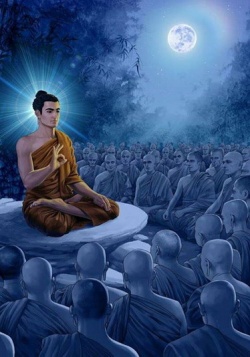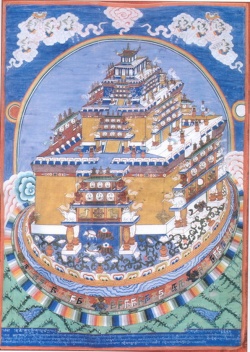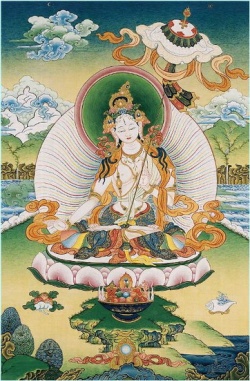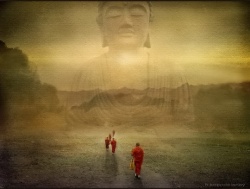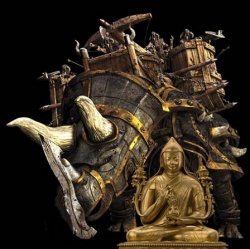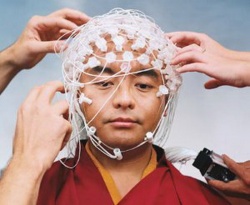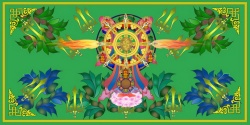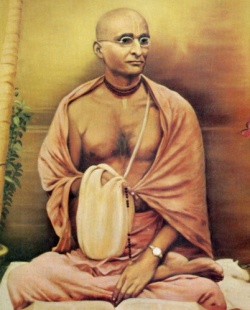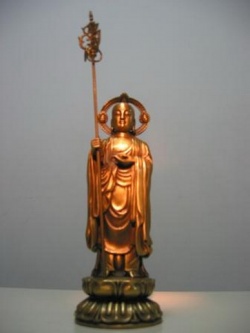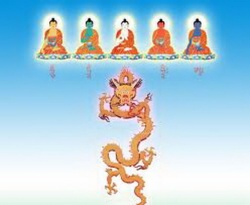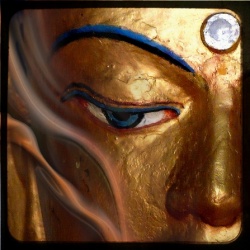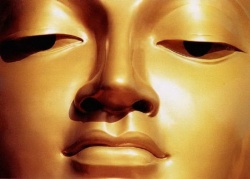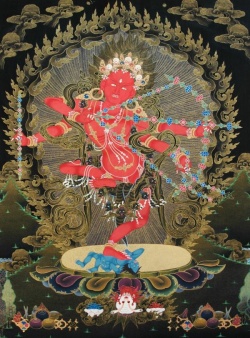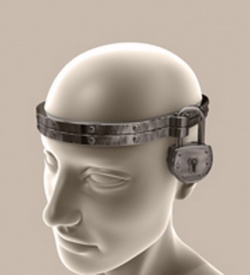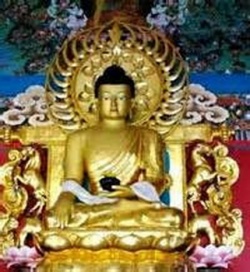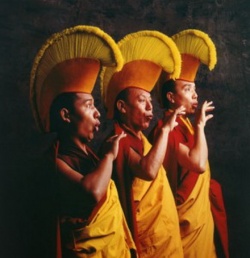Digha Nikaya, Sutta 15: The Great Downbinding Spell
Digha Nikaya
Sutta 15
Mahā-Nidānasuttaɱ
The Great Downbinding Spell
Translated from the Pali by Michael Olds
[1] I HEAR TELL:
Once upon a time The Lucky Man, Kuru-land revisiting.
Now then, "The-Word-Is-My-Work — Pleasure's the Word" is the name of a market-town of the Kurus.
There then Old Man Ananda, drew near Bhagava, drawing near, giving salutation, he took a seat to one side.
Sitting to one side then Old Man Ananda said this to The Lucky Man:
"Miraculous Bhante! Supernatural Bhante! So very deep, Bhante, is this rebounding conjuration, and so very deep appearing.
Yet to me it seems as clear as clear can be!"
[2][wrrn] "Not thus, Ananda, should this be said! Not thus, Ananda, should this be said!
Very deep, Ananda, is this recursive self-hood, and very deep does it appear.
It is, Ananda, because of not awakening to, not penetrating this phenomenon, that this age of excrudescence-covered chord-bound birth, this bull-rush-and-tule-grass run-around way of living rolls on to painful ruination."
[3][wrrn] "'Is there here the precursor[1] of aging and death?' this being asked, Ananda, 'There is.' should be the reply."
"'What precurses aging and death?' this being asked, 'Birth precurses aging and death.' should be the reply."
"'Is there here the precursor of birth?' this being asked, Ananda, 'There is.' should be the reply."
"'What precurses birth?' this being asked, 'Existence precurses birth.' should be the reply."
"'Is there here the precursor of existence?' this being asked, Ananda, 'There is.' should be the reply."
"'What precurses existence?' this being asked, 'Support precurses existence.' should be the reply."
"'Is there here the precursor of support?' this being asked, Ananda, 'There is.' should be the reply."
"'What precurses support?' this being asked, 'Thirst precurses support.' should be the reply."
"'Is there here the precursor of thirst? this being asked, Ananda, 'There is.' should be the reply."
"'What precurses thirst?' this being asked, 'Sense-experience precurses thirst.' should be the reply."
"'Is there here the precursor of sense-experience? this being asked, Ananda, 'There is.' should be the reply."
"'What precurses sense-experience?' this being asked, 'Contact precurses sense-experience.' should be the reply."
"'Is there here the precursor of contact?' this being asked, Ananda, 'There is.' should be the reply."
"'What precurses contact?' this being asked, 'Named-form precurses contact.' should be the reply."
"'Is there here the precursor of named-form?' this being asked, Ananda, 'There is.' should be the reply."
"'What precurses named-form?' this being asked, 'Consciousness precurses named-form.' should be the reply."
"'Is there here the precursor of consciousness?' this being asked, Ananda, 'There is.' should be the reply."
"'What precurses consciousness?' this being asked, 'Named-form precurses consciousness.' should be the reply.
Thus named-form precurses consciousness, consciousness precurses named-form, named-form precurses contact, contact precurses sense-experience, sense-experience precurses thirst, thirst precurses support, support precurses existence, existence precurses birth, birth precurses aging and death, grief and lamentation, pain and misery and despair.
Thus is the coming to be of this whole heap of pain.
[4][wrrn] "'Birth precurses aging and death.'
This is what I have said.
And this, Ananda, is how to understand the scope of 'Birth precurses aging and death':
If, Ananda, there were no being born at all of any sort, by any being of any sort, whatever, however; that is: of gods to godhood, spirits to spirithood, deamons to deamonhood, beings to beinghood, man to manhood, quadrupeds to quadrupedhood, of birds to birdhood, snakes to snakehood — if there were no being born by any being of thus and such a sort at all — with the non-existence of all birth, with the eradication of birth, could there then be any discerning of aging and death?
Such could not be, bhante.
Therefore here, Ananda, just this is the driving force, just this is the tie, just this gives rise to, just this is the precursor of aging and death, that is to say: birth.
[5][wrrn] "'Existence precurses birth.'
This is what I have said.
And this, Ananda, is how to understand the scope of 'Existence precurses birth.':
If, Ananda, there were no existence at all of any sort, by any being of any sort, whatever, however; that is: sensate existence, existence in forms, existence without form — with the non-existence of all existence, with the eradication of existence, could there then be any discerning of birth?
Such could not be, bhante.
Therefore here, Ananda, just this is the driving force, just this is the tie, just this gives rise to, just this is the precursor of birth, that is to say: existence.
[6][wrrn] 'Support precurses existence.'
This is what I have said.
And this, Ananda, is how to understand the scope of 'Support precurses existence.':
If, Ananda, there were no support at all of any sort by any being of any sort, whatever, however; that is: support for senescence, support for views, support for ethical conduct, rites and rituals, support for self-experience — with the non-existence of all support, with the eradication of support, could there then be any discerning of existence?
Such could not be, bhante.
Therefore here, Ananda, just this is the driving force, just this is the tie, just this gives rise to, just this is the precursor of existence, that is to say: support.
[7][wrrn] 'Thirst precurses support.'
This is what I have said.
And this, Ananda, is how to understand the scope of 'Thirst precurses support.':
If, Ananda, there were no thirst at all of any sort by any being of any sort, whatever, however; that is: thirst for forms, thirst for sounds, thirst for scents, thirst for tastes, thirst for contact, thirst for knowledge, with the non-existence of all thirst, with the eradication of thirst, could there then be any discerning of support?
Such could not be, bhante.
Therefore here, Ananda, just this is the driving force, just this is the tie, just this gives rise to, just this is the precursor of support, that is to say: thirst.
[8][wrrn] 'Sense-experience precurses thirst.'
This is what I have said.
And this, Ananda, is how to understand the scope of 'Sense-experience precurses thirst.':
If, Ananda, there were no sense-experience at all of any sort by any being of any sort, whatever, however; that is: eye-contact sense-experience, ear-contact sense-experience, nose-contact sense-experience, tongue-contact sense-experience, body-contact sense-experience, mind-contact sense-experience, with the non-existence of all sense-experience, with the eradication of sense-experience, could there then be any discerning of thirst?
Such could not be, bhante.
Therefore here, Ananda, just this is the driving force, just this is the tie, just this gives rise to, just this is the precursor of thirst, that is to say: sense-experience.
§
[9] Thus it is too, Ananda, that sense-experience precurses thirst, thirst precurses questing, questing precurses gain, gain precurses scheming, scheming precurses desirous wishes, desirous wishing precurses attachment, attachment precurses acquisition, acquisition precurses envy, envy precurses guarding, and making-guard-over precurses using the stick, using the sword, fights, disputes, retort, contention, slander, betrayal, and the coming to be of many another bad unskillful thing.
[10] 'Making-guard-over precurses using the stick, using the sword, fights, disputes, retort, contention, slander, betrayal, and the coming to be of many another bad unskillful thing.'
This is what I have said.
And this, Ananda, is how to understand the scope of 'Making-guard-over precurses using the stick, using the sword, fights, disputes, retort, contention, slander, betrayal, and the coming to be of many another bad unskillful thing.'
If, Ananda, there were no making-guard-over at all of any sort by any being of any sort, whatever, however; with the non-existence of all making-guard-over, with the eradication of making-guard-over, could there then be any discerning of using the stick, using the sword, fights, disputes, retort, contention, slander, betrayal, and the coming to be of many another bad unskillful thing?
Such could not be, bhante.
Therefore here, Ananda, just this is the driving force, just this is the tie, just this gives rise to, just this is the precursor of using the stick, using the sword, fights, disputes, retort, contention, slander, betrayal, and the coming to be of many another bad unskillful thing, that is to say: making-guard-over.
[11] 'Envy precurses guarding.'
This is what I have said.
And this, Ananda, is how to understand the scope of 'Envy precurses guarding.'
If, Ananda, there were no envy at all of any sort by any being of any sort, whatever, however; with the non-existence of all envy, with the eradication of envy, could there then be any discerning of guarding?
Such could not be, bhante.
Therefore here, Ananda, just this is the driving force, just this is the tie, just this gives rise to, just this is the precursor of guarding, that is to say: envy.
[12] 'Acquisition precurses envy.'
This is what I have said.
And this, Ananda, is how to understand the scope of 'Acquisition precurses envy.'
If, Ananda, there were no acquisition at all of any sort by any being of any sort, whatever, however; with the non-existence of all acquisition, with the eradication of acquisition, could there then be any discerning of envy?
Such could not be, bhante.
Therefore here, Ananda, just this is the driving force, just this is the tie, just this gives rise to, just this is the precursor of envy, that is to say: acquisition.
[13] 'Attachment precurses acquisition.'
This is what I have said.
And this, Ananda, is how to understand the scope of 'Attachment precurses acquisition.'
If, Ananda, there were no attachment at all of any sort by any being of any sort, whatever, however; with the non-existence of all attachment, with the eradication of attachment, could there then be any discerning of acquisition?
Such could not be, bhante.
Therefore here, Ananda, just this is the driving force, just this is the tie, just this gives rise to, just this is the precursor of acquisition, that is to say: attachment.
[14] 'Desirous wishing precurses attachment.'
This is what I have said.
And this, Ananda, is how to understand the scope of 'Desirous wishing precurses attachment.'
If, Ananda, there were no desirous wishing at all of any sort by any being of any sort, whatever, however; with the non-existence of all desirous wishing, with the eradication of desirous wishing, could there then be any discerning of attachment?
Such could not be, bhante.
Therefore here, Ananda, just this is the driving force, just this is the tie, just this gives rise to, just this is the precursor of attachment, that is to say: desirous wishing.
[15] 'Scheming precurses desirous wishes.'
This is what I have said.
And this, Ananda, is how to understand the scope of 'Scheming precurses desirous wishes.'
If, Ananda, there were no scheming at all of any sort by any being of any sort, whatever, however; with the non-existence of all scheming, with the eradication of scheming, could there then be any discerning of desirous wishes?
Such could not be, bhante.
Therefore here, Ananda, just this is the driving force, just this is the tie, just this gives rise to, just this is the precursor of desirous wishes, that is to say: scheming.
[16] 'Gain precurses scheming.'
This is what I have said.
And this, Ananda, is how to understand the scope of 'Gain precurses scheming.'
If, Ananda, there were no gain at all of any sort by any being of any sort, whatever, however; with the non-existence of all gain, with the eradication of gain, could there then be any discerning of scheming?
Such could not be, bhante.
Therefore here, Ananda, just this is the driving force, just this is the tie, just this gives rise to, just this is the precursor of scheming, that is to say: gain.
[17] 'Questing precurses gain.'
This is what I have said.
And this, Ananda, is how to understand the scope of 'Questing precurses gain.'
If, Ananda, there were no questing at all of any sort by any being of any sort, whatever, however; with the non-existence of all questing, with the eradication of questing, could there then be any discerning of gain?
Such could not be, bhante.
Therefore here, Ananda, just this is the driving force, just this is the tie, just this gives rise to, just this is the precursor of gain, that is to say: questing.
[18] 'Thirst precurses questing.'
This is what I have said.
And this, Ananda, is how to understand the scope of 'Thirst precurses questing.'
If, Ananda, there were no thirst at all of any sort by any being of any sort, whatever, however; with the non-existence of all thirst, with the eradication of thirst, could there then be any discerning of questing?
Such could not be, bhante.
Therefore here, Ananda, just this is the driving force, just this is the tie, just this gives rise to, just this is the precursor of questing, that is to say: thirst.
§
[19][wrrn] 'Contact precurses sense-experience.'
This is what I have said.
And this, Ananda, is how to understand the scope of 'Contact precurses sense-experience.':
If, Ananda, there were no contact at all of any sort by any being of any sort, whatever, however; that is: eye-contact, ear-contact, nose-contact, tongue-contact, body-contact, mind-contact, with the non-existence of all contact, with the eradication of contact, could there then be any discerning of sense-experience?
Such could not be, bhante.
Therefore here, Ananda, just this is the driving force, just this is the tie, just this gives rise to, just this is the precursor of sense-experience, that is to say: contact.
[20][wrrn] 'Named-form precurses contact.'
This is what I have said.
And this, Ananda, is how to understand the scope of 'Named-form precurses contact.':
If, Ananda, those makings, those characteristics, those signs, by which a named body is known — if those makings, those characteristics, those signs, had no being, could there then be any discerning of identification-contact with a formed body?
Such could not be, bhante.
If, Ananda, those makings, those characteristics, those signs, by which a formed body is known — if those makings, those characteristics, those signs, had no being, could there then be any discerning of resistance-contact with a named body?
Such could not be, bhante.
If, Ananda, those makings, those characteristics, those signs, by which are known the formed body and the named body — if those makings, those characteristics, those signs, had no being, could there then be any discerning of either identification-contact or resistance-contact?
Such could not be, bhante.
If, Ananda, those makings, those characteristics, those signs, by which are known the formed body and the named body — if those makings, those characteristics, those signs, had no being, could there then be any discerning of contact?
Such could not be, bhante.
Therefore here, Ananda, just this is the driving force, just this is the tie, just this gives rise to, just this is the precursor of contact, that is to say: named-form.
[21][wrrn] 'Consciousness precurses named-form.'
This is what I have said.
And this, Ananda, is how to understand the scope of 'Consciousness precurses named-form.':
If, Ananda, consciousness were not to enter the mother's womb, could named-form develop itself there?
Such could not be, bhante.
If, Ananda, consciousness having entered the mother's womb, were to be revoked from there could named-form develop there in such and such a way so as to arrive at birth?
Such could not be, bhante.
If, Ananda, consciousness in some little boy or girl were to be revoked from there could there be shown the development, growth, flowering of their named-forms?
Such could not be, bhante.
Therefore here, Ananda, just this is the driving force, just this is the tie, just this gives rise to, just this is the precursor of named-form, that is to say: consciousness.
[22][wrrn] 'Named-form precurses consciousness.'
This is what I have said.
And this, Ananda, is how to understand the scope of 'Named-form precurses consciousness.':
If, Ananda, consciousness were not to gain named-form, could there then be any discerning of birth, aging and death, the coming to be and development of pain?
Such could not be, bhante.
Therefore here, Ananda, just this is the driving force, just this is the tie, just this gives rise to, just this is the precursor of consciousness, that is to say: named-form.
To this extent only, Ananda, is there birth, aging, death, disappearance and reappearance — to this extent is there verbal expression — to this extent is there getting to the root — to this extent is there knowing — to this extent is there scope for discriminating and drawing distinctions — to this extent is there this run'n-round showing up as some sort of being 'this' at some place of being 'at' — that is to say: only just as far as named-form with consciousness.
[23][wrrn] And in what ways, Ananda, is there discrimination and drawing distinctions concerning self?
Holding, Ananda, that the self is material and circumscribed, saying: 'My self is material and circumscribed,' there is discrimination and drawing distinction.
Holding, Ananda, that the self is material and unending, saying: 'My self is material and unending,' there is discrimination and drawing distinction.
Holding, Ananda, that the self is immaterial and circumscribed, saying: 'My self is immaterial and circumscribed,' there is discrimination and drawing distinction.
Holding, Ananda, that the self is immaterial and unending, saying: 'My self is immaterial and unending,' there is discrimination and drawing distinction.
[24] Whoever, Ananda, discriminating and distinguishing the self as material and circumscribed, either discriminates and distinguishes the self as material and circumscribed in the present, or discriminates and distinguishes the self as becoming material and circumscribed, saying; "Although it is not thus it will be thus in time."
This is sufficient to describe the 'material and cricumscribed' point of view.
Whoever, Ananda, discriminating and distinguishing the self as material and unending, either discriminates and distinguishes the self as material and unending in the present, or discriminates and distinguishes the self as becoming material and unending, saying: "Although it is not thus it will be thus in time."
This is sufficient to describe the 'material and unending' point of view.
Whoever, Ananda, discriminating and distinguishing the self as immaterial and circumscribed, either discriminates and distinguishes the self as immaterial and circumscribed in the present, or discriminates and distinguishes the self as becoming immaterial and circumscribed, saying; "Although it is not thus it will be thus in time."
This is sufficient to describe the 'immaterial and cricumscribed' point of view.
Whoever, Ananda, discriminating and distinguishing the self as immaterial and unending, either discriminates and distinguishes the self as immaterial and unending in the present, or discriminates and distinguishes the self as becoming immaterial and unending, saying: "Although it is not thus it will be thus in time."
This is sufficient to describe the 'material and unending' point of view.
'Nuf-said with regard to those who discriminate and draw distinctions with regard to self.
[25] And in what ways, Ananda, is there no discrimination and drawing distinctions concerning self?
Not holding, Ananda, that the self is material and circumscribed, saying: 'My self is material and circumscribed,' there is no discrimination and no drawing distinction.
Not holding, Ananda, that the self is material and unending, saying: 'My self is material and unending,' there is no discrimination and no drawing distinction.
Not holding, Ananda, that the self is immaterial and circumscribed, saying: 'My self is immaterial and circumscribed,' there is no discrimination and no drawing distinction.
Not holding, Ananda, that the self is immaterial and unending, saying: 'My self is immaterial and unending,' there is no discrimination and no drawing distinction.
[26] Whoever, Ananda, not discriminating and not distinguishing the self as material and circumscribed, neither discriminates and distinguishes the self as material and circumscribed in the present, nor discriminates and distinguishes the self as becoming material and circumscribed, saying; "Although it is not thus it will be thus in time."
This is sufficient to describe the non-holding of the 'material and cricumscribed' point of view.
Whoever, Ananda, not discriminating and distinguishing the self as material and unending, neither discriminates and distinguishes the self as material and unending in the present, nor discriminates and distinguishes the self as becoming material and unending, saying: "Although it is not thus it will be thus in time."
This is sufficient to describe the non-holding of the 'material and unending' point of view.
Whoever, Ananda, not discriminating and distinguishing the self as immaterial and circumscribed, neither discriminates and distinguishes the self as immaterial and circumscribed in the present, nor discriminates and distinguishes the self as becoming immaterial and circumscribed, saying; "Although it is not thus it will be thus in time."
This is sufficient to describe the non-holding of the 'immaterial and cricumscribed' point of view.
Whoever, Ananda, not discriminating and distinguishing the self as immaterial and unending, neither discriminates and distinguishes the self as immaterial and unending in the present, nor discriminates and distinguishes the self as becoming immaterial and unending, saying: "Although it is not thus it will be thus in time."
This is sufficient to describe the non-holding of the 'material and unending' point of view.
And that's 'nuf-said with regard to those who do not discriminate and draw distinctions with regard to self.
§
[27] And what is it, Ananda, that is perceived and regarded in mind as self?
Sense experience, Ananda, is perceived and regarded in mind as self.
Saying: "Sense experience is my self," or "Sense experience is not my self, my self is without sense experience," thus the self is perceived and regarded in mind.
Saying: "Sense experience is not my self and my self is not without sense experience, my self experiences the phenomena of sensation," thus, Ananda, the self is perceived and regarded in mind.
[28][wrrn] In the case, Ananda, of one who says: "Sense experience is my self," one should say: "Three, friend, are the sense experiences: pleasant sense experience; unpleasant sense experience; sense experience that is neither unpleasant nor pleasant.
Of these three sense experiences, which is it that is the self of you?'
At sucha time, Ananda, as a pleasant sense experience is experienced, there is no experience of unpleasant sense experience, no experience of sense experience which is not unpleasant but not pleasant; at that time only pleasant sense experience is experienced.
At sucha time, Ananda, as an unpleasant sense experience is experienced, there is no experience of pleasant sense experience, no experience of sense experience which is not unpleasant but not pleasant; at that time only unpleasant sense experience is experienced.
At sucha time, Ananda, as sense experience that is not unpleasant but not pleasant is experienced, there is no experience of pleasant sense experience, no experience of sense experience which is unpleasant; at that time only sense experience that is not unpleasant but not pleasant is experienced.
[29][wrrn] Now, Ananda, pleasure is a sensation which is inconstant, own-made, appearing by way of precursors, a passing thing, an aging thing, a fading thing, an ending thing; pain is a sensation which is inconsistant, own-made, appearing by way of precursors, a passing thing, an aging thing, a fading thing, an ending thing; the neither unpleasant nor pleasant sensation is one which is inconsistant, own-made, appearing by way of precursors, a passing thing, an aging thing, a fading thing, an ending thing.
He who holds, Ananda, that the experience of pleasant sensation is the self, stating: "This is the self of me;" at the ending of that pleasant sensation must also hold that: "The self of me has gone."
He who holds, Ananda, that the experience of unpleasant sensation is the self, stating: "This is the self of me;" at the ending of that unpleasant sensation must also hold that: "The self of me has gone."
He who holds, Ananda, that the experience of sensation that is neither unpleasant nor pleasant is the self, stating: "This is the self of me;" at the ending of that sensation that is neither unpleasant nor pleasant must also hold that: "The self of me has gone."
Thus to hold that "Sense experience is my self," is to perceive and regard the self even in the here and now as inconstant, subject to pain and pleasure, a thing that comes and goes.
Such being so, Ananda, holding the view that "Sense experience is my self" is not recommended.
[30][wrrn] In the case, Ananda, of one who says: "Sense experience is not my self, my self is without sense experience," one should say: 'In the case, friend, where there was no sense experience at all, could one say: "This is me?"'
Answering properly, "Such could not be, bhante,' would be the reply.
Such being so, Ananda, holding the view that "Sense experience is not my self, my self is without sense experience" is not recommended.
[31][wrrn] In the case, Ananda, of one who says: "Sense experience is not my self and my self is not without sense experience, my self experiences the phenomena of sensation," one should say: "If sense experience of every kind were to become completely ended, were all sense experience to not be; with the end of sense experience would it be possible to point to and say: "I am this,"?
Answering properly, "Such could not be, bhante,' would be the reply.
Such being so, Ananda, holding the view that "Sense experience is not my self and my self is not without sense experience, my self experiences the phenomena of sensation," is not recommended.
[32][wrrn] From that time when, Ananda, a Beggar does not perceive the self as sense experience; or does not perceive the self as without sense experience; or does not perceive the self as not sense experience but not without sense experience — experiencing the phenomena of sensation; thus not perceiving, there is nothing in the world with which he is involved, not involved he is untroubled, untroubled he has thoroughly unbound himself, and he knows:
"Left behind is birth, lived is the best of lives, done is duty's doing, no further it'n'n'at'n for me!"
To a Beggar thus freed in mind, Ananda, saying: "The That-that's-got-that exists after death;" such a view would not appear too brilliant; "The That-that's-got-that does not exist after death;" such a view would not appear too brilliant; "The That-that's-got-that neither exists nor does not exist after death;" such a view would not appear too brilliant; "The That-that's-got-that both exists and does not exist after death;" such a view would not appear too brilliant.
How come?
Because, Ananda, as far as description and the scope of description; as far as getting to the root and the scope of getting to the root; as far as delineation and the scope of delineation; as far as wisdom and range of wisdom as far as the rolling of this rolling-on, this Beggar has seen with higher-knowledge, and to hold the view that that beggar with higher knowledge does not know and see would not appear too brilliant.
[33] There are, Ananda, seven footholds of consciousness: and two realms.
What seven?
There are beings, Ananda, diverse in body, diverse in perception suchas man, some gods and some on the path to ruin.
This is the first foothold of consciousness.
There are beings, Ananda, diverse in body, similar in perception, such as the gods in the Brahma group.
This is the second foothold of consciousness.
There are beings, Ananda, similar in body, diverse in perception, suchas the gods of the Abhassara.
This is the third foothold of consciousness.
There are beings, Ananda, similar in body and similar in perception, such as the gods of the Subhakiṇhā.
This is the fourth foothold of consciousness.
There are beings, Ananda that, passing past all perception of forms, leaving behind perception of reaction, averting the mind from perception of diversity, thinking 'Unending is space,' experience the Realm of Space.
This is the fifth foothold of consciousness.
There are beings, Ananda that, wholly passing past the Realm of Space, thinking "Unending is Consciousness,' experience the Realm of Consciousness.
This is the sixth foothold of consciousness.
There are beings, Ananda that, wholly passing past the Realm of Consciousness, thinking 'There are No Things There,' experience the Realm Where There are No Things There.
This is the seventh foothold of consciousness.
And there is the Realm of Non-percepience and there is the Realm of Neither Perception nor Non-Perception.
[34] Now, Ananda, with regard to the first foothold of consciousness wherein are beings diverse in body, diverse in perception suchas man, some gods and some on the path to ruin; understanding such, Ananda, understanding it's coming to be; understanding it's passing away; understanding it's gratifications; understanding it's dangers, would it be bright of one to become overjoyed with such?
Such could not be, bhante.
And again, Ananda, with regard to the second foothold of consciousness wherein are beings diverse in body, similar in perception, such as the gods in the Brahma group; understanding such, Ananda, understanding it's coming to be; understanding it's passing away; understanding it's gratifications; understanding it's dangers, would it be bright of one to become overjoyed with such?
Such could not be, bhante.
And again, Ananda, with regard to the third foothold of consciousness wherein are beings similar in body, diverse in perception, suchas the gods of the Abhassara; understanding such, Ananda, understanding it's coming to be; understanding it's passing away; understanding it's gratifications; understanding it's dangers, would it be bright of one to become overjoyed with such?
Such could not be, bhante.
And again, Ananda, with regard to the fourth foothold of consciousness wherein are beings similar in body and similar in perception, such as the gods of the Subhakiṇhā; understanding such, Ananda, understanding it's coming to be; understanding it's passing away; understanding it's gratifications; understanding it's dangers, would it be bright of one to become overjoyed with such?
Such could not be, bhante.
And again, Ananda, with regard to the fifth foothold of consciousness wherein are beings passing past all perception of form, leaving behind perception of reaction, averting the mind from perception of diversity, thinking 'Unending is space,' experience the Realm of Space; understanding such, Ananda, understanding it's coming to be; understanding it's passing away; understanding it's gratifications; understanding it's dangers, would it be bright of one to become overjoyed with such?
Such could not be, bhante.
And again, Ananda, with regard to the sixth foothold of consciousness wherein are beings wholly passing past the Realm of Space, thinking "Unending is Consciousness,' experience the Realm of Consciousness; understanding such, Ananda, understanding it's coming to be; understanding it's passing away; understanding it's gratifications; understanding it's dangers, would it be bright of one to become overjoyed with such?
Such could not be, bhante.
And again, Ananda, with regard to the seventh foothold of consciousness wherein are beings wholly passing past the Realm of Consciousness, thinking 'There are No Things There,' experience the Realm Where There is No Thing There; understanding such, Ananda, understanding it's coming to be; understanding it's passing away; understanding it's gratifications; understanding it's dangers, would it be bright of one to become overjoyed with such?
Such could not be, bhante.
And again, Ananda, with regard to the Realm of Non-percepience and the Realm of Neither Perception nor Non-Perception; understanding such, Ananda, understanding it's coming to be; understanding it's passing away; understanding it's gratifications; understanding it's dangers, would it be bright of one to become overjoyed with such?
Such could not be, bhante.
In so far, Ananda, as a Beggar, with regard to the seven footholds of consciousness and the two realms, their coming to be, their passing away, their gratifications, their dangers, freed from such, such a being, so freed, so knowing, attained to freedom, I say of such, such a Beggar is wisdom-freed.
[35] There are, Ananda, these eight releases.
What eight?
This is the first release.
Perceiving the personally immaterial one sees external form.
This is the second release.
Thinking "How pure!" he intends to get that.
This is the third release.
Elevating himself above all perceptions of materiality, allowing perceptions of resistance to subside, not scrutinizing perceptions of diversity, thinking: 'Un-ending is space.' he enters into and makes a habitat of the Space-dimension.
This is the fourth release.
Elevating himself completely above the Space-dimension, thinking: 'Un-ending is consciousness.' he enters into and makes a habitat of the Consciousness-dimension.
This is the fifth release.
Elevating himself completely above the Consciousness-dimension, thinking: 'There are no things there.' he enters into and makes a habitat of the No-things-there dimension.
This is the sixth release.
Elevating himself completely above the No-things-there-dimension he enters into and makes a habitat of the Dimension of Neither-perception-nor-non-perception.
This is the seventh release.
Elevating himself completely above the Dimension of Neither-perception-nor-non-perception, he enters into and makes a habitat of the sense-experience-perception-ending.
This is the eighth release.
[36] When, Ananda, a Beggar can attain these eight releases in progressive order, can attain them in retrogressive order, can attain them in progressive and retrogressive order, can attain them, entering as he wishes, emerging as he wishes, whenever, however and for as long as he wishes, and when, having destroyed the corruptions, with uncorrupted mental freedom wisely freed in this seen thing by his own super-knowledge of the truth, having entered into and making a habitat of that, I say of such a Bhikkhu that he is both-ways freed, and of the both-ways freeds there may be, Ananda, I say there is none greater nor more bountiful than this.
This is what the Bhagava said, And the elder Ananda was greatly pleased thereat. </poem>
Footnotes
[1] Idappaccayā. Here-percuss, result, rebound. Bhk. Thanissaro's: 'demonstrable requisite condition' is also good. The way I was taught this is helpful. Think of what it is that is required in order to make a cup of tea. Tea, water, a cup, heat to heat the water, a teapot, a teakettle, the effort of an individual ... and a virtually unlimited number of related things. No thing there can be said to be 'the cause' of the cup of tea. One thing can be said to be an essential ingrediant: the tea. Without the tea it would not be possible to make a cup of tea. One might say: 'Without the water, no cup of tea could be made either,' but that is to take the argument off into another direction. We are looking for the single-most proximate requisite for the result, or, as in our case here, which would result in the prevention of the progression of the series.
References:
Anyone wishing to track the changes in the terminology I have used in this translation can consult the previous translation which is available at: dn.15.olds.old.bd.htm


